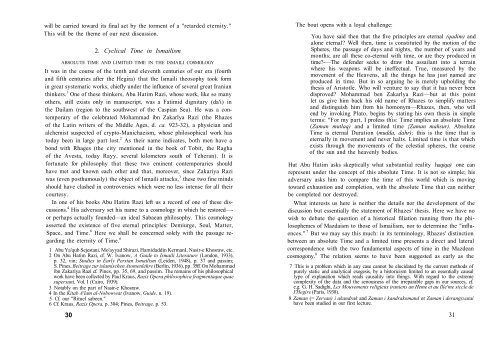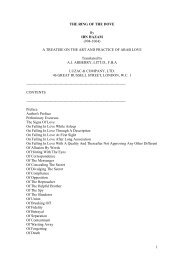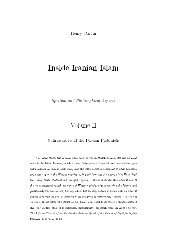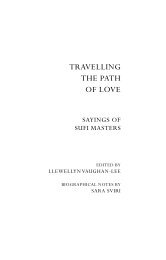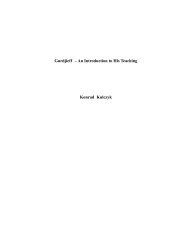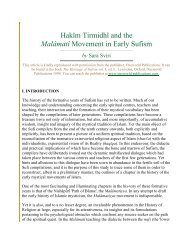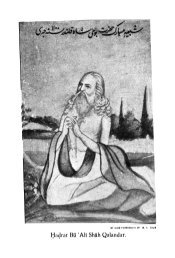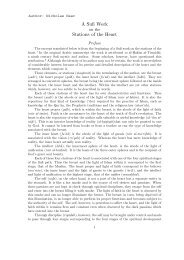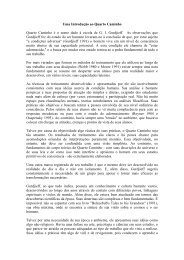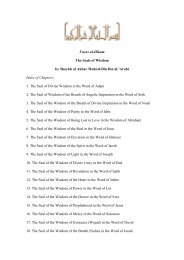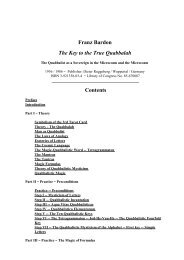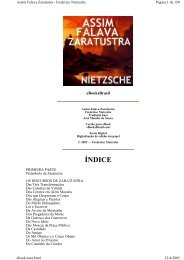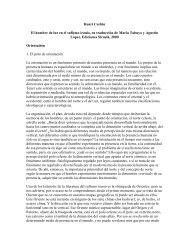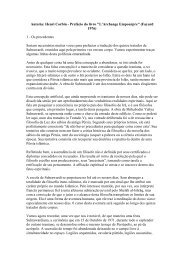Cyclical Time and Ismaili Gnosis - ImagoMundi
Cyclical Time and Ismaili Gnosis - ImagoMundi
Cyclical Time and Ismaili Gnosis - ImagoMundi
Create successful ePaper yourself
Turn your PDF publications into a flip-book with our unique Google optimized e-Paper software.
will be carried toward its final act by the torment of a "retarded eternity."<br />
This will be the theme of our next discussion.<br />
2. <strong>Cyclical</strong> <strong>Time</strong> in <strong>Ismaili</strong>sm<br />
ABSOLUTE TIME AND LIMITED TIME IN THE ISMAILI COSMOLOGY<br />
It was in the course of the tenth <strong>and</strong> eleventh centuries of our era (fourth<br />
<strong>and</strong> fifth centuries after the Hegira) that the <strong>Ismaili</strong> theosophy took form<br />
in great systematic works, chiefly under the influence of several great Iranian<br />
thinkers. 1 One of these thinkers, Abu Hatim Razi, whose work, like so many<br />
others, still exists only in manuscript, was a Fatimid dignitary (da'i) in<br />
the Dailam (region to the southwest of the Caspian Sea). He was a contemporary<br />
of the celebrated Mohammad ibn Zakarlya Razi (the Rhazes<br />
of the Latin writers of the Middle Ages, d. ca. 923-32), a physician <strong>and</strong><br />
alchemist suspected of crypto-Manichaeism, whose philosophical work has<br />
today been in large part lost. 2 As their name indicates, both men have a<br />
bond with Rhages (the city mentioned in the book of Tobit, the Ragha<br />
of the Avesta, today Rayy, several kilometers south of Teheran). It is<br />
fortunate for philosophy that these two eminent contemporaries should<br />
have met <strong>and</strong> known each other <strong>and</strong> that, moreover, since Zakariya Razi<br />
was (even posthumously) the object of <strong>Ismaili</strong> attacks, 3 these two fine minds<br />
should have clashed in controversies which were no less intense for all their<br />
courtesy.<br />
In one of his books Abu Hatim Razi left us a record of one of these discussions.<br />
4 His adversary set his name to a cosmology in which he restored—-<br />
or perhaps actually founded—an ideal Sabaean philosophy. This cosmology<br />
asserted the existence of five eternal principles: Demiurge, Soul, Matter,<br />
Space, <strong>and</strong> <strong>Time</strong>. 6 Here we shall be concerned solely with the passage regarding<br />
the eternity of <strong>Time</strong>. 6<br />
1 Abu Ya'qub Sejestani, Mo'ayyad Shirazi, Hamidaddin KermanI, Nasir-e Khosraw, etc.<br />
2 On Abu Hatim Razi, cf. W. Ivanow, A Guide to <strong>Ismaili</strong> Literature (London, 1933),<br />
p. 32, vin; Studies in Early Persian <strong>Ismaili</strong>sm (Leiden, 1948), p. 37 <strong>and</strong> passim;<br />
S. Pines, Beitrage zur islamischen Atomenlehre (Berlin, 1936), pp. 35ff. On Mohammad<br />
ibn Zakariya Razi cf. Pines, pp. 35, 69, <strong>and</strong> passim. The remains of his philosophical<br />
work have been collected by Paul Kraus, Razis Opera philosophica fragmentaque quae<br />
supersunt, Vol. I (Cairo, 1939).<br />
3 Notably on the part of Nasir-e Khosraw.<br />
4 In the Kitab A'lam al-Nobowwat (Ivanow, Guide, n. 19).<br />
5 Cf. our "Rituel sabeen."<br />
6 Cf. Kraus, Razis Opera, p. 304; Pines, Beitrage, p. 53.<br />
30<br />
The bout opens with a loyal challenge:<br />
You have said then that the five principles are eternal (qadim) <strong>and</strong><br />
alone eternal? Well then, time is constituted by the motion of the<br />
Spheres, the passage of days <strong>and</strong> nights, the number of years <strong>and</strong><br />
months; are all these co-eternal with time, or are they produced in<br />
time?-—The defender seeks to draw the assailant into a terrain<br />
where his weapons will be ineffectual. True, measured by the<br />
movement of the Heavens, all the things he has just named are<br />
produced in time. But in so arguing he is merely upholding the<br />
thesis of Aristotle. Who will venture to say that it has never been<br />
disproved? Mohammad ben Zakarlya Razi—but at this point<br />
let us give him back his old name of Rhazes to simplify matters<br />
<strong>and</strong> distinguish him from his homonym—Rhazes, then, who will<br />
end by invoking Plato, begins by stating his own thesis in simple<br />
terms: "For my part, I profess this: <strong>Time</strong> implies an absolute <strong>Time</strong><br />
(Zaman mutlaq) <strong>and</strong> a limited time {Zaman mahsur). Absolute<br />
<strong>Time</strong> is eternal Duration (mudda, dahr); this is the time that is<br />
eternally in movement <strong>and</strong> never halts. Limited time is that which<br />
exists through the movements of the celestial spheres, the course<br />
of the sun <strong>and</strong> the heavenly bodies.<br />
Hut Abu Hatim asks skeptically what substantial reality haqiqa) one can<br />
represent under the concept of this absolute <strong>Time</strong>. It is not so simple; his<br />
adversary asks him to compare the time of this world which is moving<br />
toward exhaustion <strong>and</strong> completion, with the absolute <strong>Time</strong> that can neither<br />
be completed nor destroyed.<br />
What interests us here is neither the details nor the development of the<br />
discussion but essentially the statement of Rhazes' thesis. Here we have no<br />
wish to debate the question of a historical filiation running from the philosophemes<br />
of Mazdaism to those of <strong>Ismaili</strong>sm, nor to determine the "influences."<br />
7 But we may say this much: in its terminology, Rhazes' distinction<br />
between an absolute <strong>Time</strong> <strong>and</strong> a limited time presents a direct <strong>and</strong> lateral<br />
correspondence with the two fundamental aspects of time in the Mazdean<br />
cosmogony. 8 The relation seems to have been suggested as early as the<br />
7 This is a problem which in any case cannot be elucidated by the current methods of<br />
purely static <strong>and</strong> analytical exegesis, by a historicism limited to an essentially causal<br />
type of explanation which reads causality into things. With regard to the extreme<br />
complexity of the data <strong>and</strong> the seriousness of the irreparable gaps in our sources, cf.<br />
e.g. G. H. Sadighi, Les Mouvements religieux iraniens an Heme et au Ille'me siccle de<br />
I'Hegire (Paris, 1938).<br />
8 Zaman (= Zervan) i ak<strong>and</strong>rak <strong>and</strong> Zaman i k<strong>and</strong>rakom<strong>and</strong> or Zaman i derangxvatai<br />
have been studied in our first lecture.<br />
31


